Sudanese couple on trial after conversion to Christianity
- Who: Nada and Hamouda
- Where: Sudan
- Advocacy Team: Kelsey Zorzi, Sean Nelson
Topic | Persecution
Nada (wife) and Hamouda (husband)*, a married Sudanese Christian convert couple, are now safe in the United States after facing baseless charges for converting to Christianity. Despite the decriminalization of apostasy, if found guilty, they could have been punished by 100 lashes each, and Hamouda also faced one year of expatriation.
Both international and Sudanese law protect Nada and Hamouda’s right to choose and live out their faith. But converts to Christianity face severe pressure and threats in Sudan. The interplay between Sharia and civil courts in this case shows how those who are hostile to converts can weaponize the legal system to go after people who have done nothing wrong.
Mariam Ibrahim, has become a spokesperson for Sudanese converts suffering persecution. In 2014, she was sentenced to death for apostasy under Sudan’s Sharia law because she was married to a Christian. At 8 months pregnant, she was flogged, and imprisoned while awaiting the death penalty, but was ultimately released and able to find safety in the United States.
You are currently viewing a placeholder content from YouTube. To access the actual content, click the button below. Please note that doing so will share data with third-party providers.
More Information"Everyone should be free to choose and live out their faith without fear of legal sanctions on their personal life. We urge the courts to protect converts, rather than punish them."
- Kelsey Zorzi, Director of Advocacy for Global Religious Freedom
Case summary
Nada and Hamouda were both Muslims when they married in 2016. When Hamouda converted to Christianity in 2018, Nada’s family exerted threats against her and applied pressure to have a Sharia court dissolve their marriage. At the time, Sudan also considered apostasy a crime worthy of the death penalty, further increasing the pressure on the couple to separate. As a direct result of Hamouda’s conversion, the Sharia court annulled the marriage, and Nada and the couple’s two children went to stay with her family. In 2020 apostasy was decriminalized in Sudan. Shortly afterwards, in 2021, Nada converted to Christianity and returned home to her husband with their children.
The couple considers the Sharia court’s annulment of their marriage to be illegitimate because it was initiated under duress from Nada’s family, and because Nada did not consider her own conversion to be possible. Because of the criminalization of apostasy, she could have faced severe consequences had she been accused of apostasy. Nada’s brother made good on his threats against Nada after she converted and returned to Hamouda by bringing their marriage to the attention of the Sudanese criminal prosecutor alleging adultery. Nada and Hamouda each face a penalty of 100 lashes, with Hamouda facing the possibility of an additional punishment of one year in exile.
Mariam Ibrahim’s ordeal
Only 4.4% of the Sudan’s 44.6 million population is Christian. According to OpenDoors, Christian women and girls in Sudan, particularly converts, are vulnerable to rape, forced marriage and domestic violence because of their faith. Woman converts are also denied inheritance and, if they’re already married, are forcibly divorced from their husbands.
Sudan has recently experienced tumultuous political changes. Until recently, the government criminalized apostasy and adultery charges have been used to punish converts, as in the famous case of Mariam Ibrahim. In May 2014, while 8 months pregnant, she was sentenced to death for apostasy under Sudan’s Sharia law and was flogged for being married to a Christian. Mariam was forced to give birth to her baby daughter while shackled in a prison cell that she was confined to with her other one-year old child. She now advocates for everyone’s right to live out their faith freely without fear of persecution:
“I lived the painful experience of a Christian woman shackled in prison because of my faith. It saddens me that even after the decriminalization of apostasy, the courts still fail to protect religious minorities, especially Christian converts. There are many others out there who suffer like Nada and Hamouda because they are targeted for their faith. Sudan must protect religious freedom and all those who wish to exercise it. The international community must speak out on Nada and Hamouda’s behalf, as they did in my case,” said Mariam Ibrahim.
Courts “weaponized” to persecute converts
After a revolution in 2019, Sudan looked to be making improvements regarding the state of religious freedom, including by decriminalizing apostasy. But a military coup in October 2021 has put much of this progress at risk.
“Courts shouldn’t be weaponized to persecute converts. Although apostasy has been decriminalised in Sudan, Christian converts are still being persecuted. Nada and Hamouda’s case is a significant test of whether Sudan’s legal reforms on religious freedom made during the transitional government in 2020 will be recognized and protected by the courts,” said Sean Nelson, Legal Counsel for ADF International.
“Sudan is one of the few countries to have been removed from the United States’ list of Countries of Particular Concern, after having received a CPC designation for almost twenty consecutive years (1999-2018). It would be a massive blow to those suffering in Sudan as well as the international human rights community for Sudan to backslide on its progress towards religious freedom. ADF International and other human rights organizations will be closely monitoring this case and other similar cases that threaten the religious freedom of individuals in Sudan,” said Kelsey Zorzi, Director of Advocacy for Global Religious Freedom.
*Surnames withheld
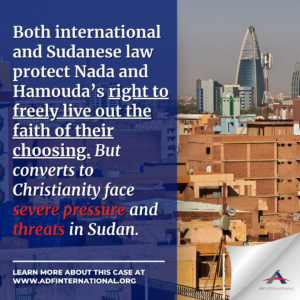
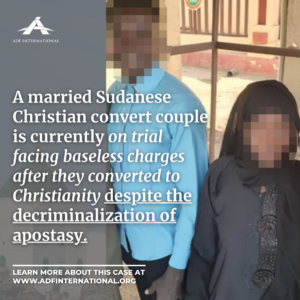
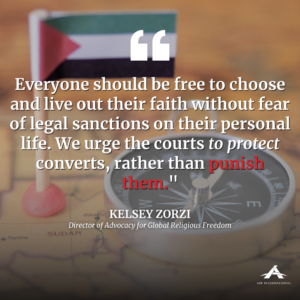
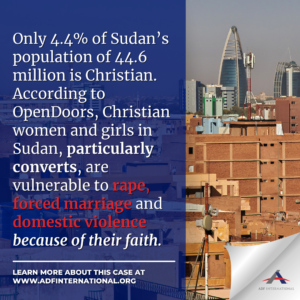
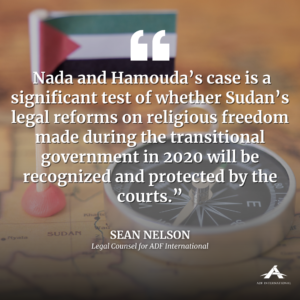
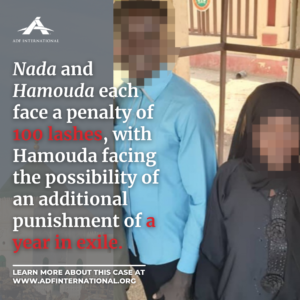
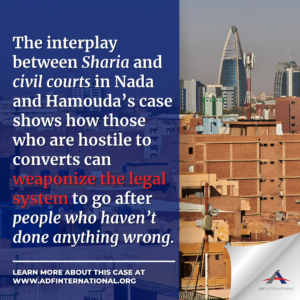
Support Religious Freedom
Your gift can support fundamental freedoms for this couple and others like them across the world. Thank you for your generosity.
Stay Informed
Get involved! Sign up to receive updates:
"*" indicates required fields


